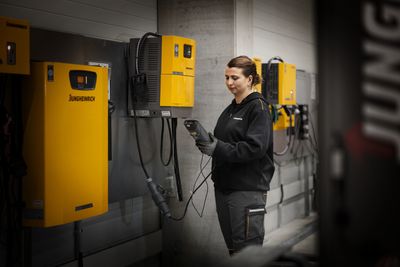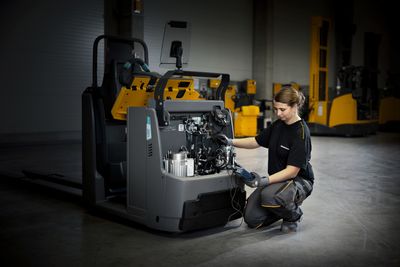A Day in the Life: two FLT engineers - Pamela Eaves & Frances Tebbutt
Published:
Read Time: 6 mins
In celebration of International Women's Day, we meet two FLT engineers, Pamela Eaves (PE) and Frances Tebbutt (FT) and explore their routes into engineering, the most challenging aspects of their work with Jungheinrich UK, and their advice for other women thinking of an engineering career.
Tell us about your role
PE: My job entails maintenance on the trucks - preventative maintenance and breakdown. I work on the tools.
I start at half past seven. I see what my dispatchers put on the job list and I basically go to whichever site I'm sent. I could be on a site where I've got several services booked, maybe get called to a couple of breakdowns, or I can be driving around pretty much all day checking on our customers’ trucks.
FT: I carry out full maintenance on the trucks. That could be preventative maintenance, like servicing and generally looking after the FLTs, cleaning, tidying and repairs. I also fix them when things go wrong. Every truck has a service schedule which generally lowers the amount of breakdowns.
How did you become an FLT engineer?
FT: I did my apprenticeship with Jungheinrich UK actually. Before doing it, I used to work in a warehouse driving the trucks, but I wanted more. My dad's a mechanic and I wanted to be more hands on and have a career with development.
The warehouse I used to work at had Jungheinrich trucks. I was talking to the engineer who used to service them and suggested I’d like to go into that side of things. About six months later he said, “If you're still interested there's apprenticeships available.”
I did that almost six years ago. It was a three-year apprenticeship, and I’ve now got a level 3 NVQ.
PE: I just like mechanical things. I like seeing how things work, it interests me. I was previously a PSV mechanic, which is a bus mechanic and I wanted to progress more. I did an apprenticeship with a bus company and have an NVQ level 3 in mechanical engineering.
I’ve been in the job a year, and it’s taken a little bit of adjustment. For example, it's absolute bliss when you've got a workshop and you've got everything to hand and you've got easy access to look at the problems. This tends not to be the case with FLTs. It’s a bit different – but it’s a great job… and they don't all weigh 12 tonnes!
What skills are most important in your role?
PE: You need to have a logical mindset. And you need to be able to see how things work.
You need dedication as well, because winters are horrible… oh yeah, you need good thermal underwear too!
FT: You need to be able to work as a team and individually too. I suppose you must have to be pretty resourceful, as you don’t know what you’re going to be called out to - that’s all about experience. Once you've been doing it a little while, you just generally know what’s needed. For example, I go to one site quite often and I know the trucks so well I even remember their serial numbers.
You’re the face of the company to your customers. I ended up servicing the trucks in the warehouse where I used to drive them. It was strange going back into the same workplace with a totally different role.
I still go there regularly and I've got a really good working relationship with all the managers there. They’ve known me for ten years and have seen me grow.
What is the most challenging aspect of your work?
FT: You just don't really know what to expect – but that’s the good side too.
PE: I think for me, what's challenging is I never trained to be a forklift engineer; I trained to be a bus mechanic. So going from that kind of environment into this environment was a lot to get your head round and there were lots of different ways of working. For example, if a bus needed a new brake calliper, you just fixed it. Here we need to check the service contract and get the paperwork signed off.
What are your proudest achievements?
FT: Completing my apprenticeship and then every day getting better and improving. I used to really struggle with confidence, and now I'm getting more confident and tackling harder jobs.
What do you enjoy the most about your job?
FT: The support from my colleagues.
PE: I'm really enjoying the team leader aspect of the job. I enjoy looking after my team.
I do a lot of the paperwork side of things and I like to check in with them. I can phone them up randomly and be that listening ear for them. To be honest, being an engineer can be a lonely job, because you can be out and about and not see anyone. It’s just you. So as well as being resourceful, it’s good to have your team to call on. And we have each other to ask about, say, a particular fault code, or how to figure something out.
When I first started, I was like a rabbit in the headlights. My team were amazing – they stopped what they were doing to share their knowledge until I figured it all out. Without them, I don't think I’d still be in the job.
What one thing about your role would others find most surprising?
PE: Probably that there’s a women rocking up as an engineer!
What did you find most surprising about the role?
FT: That’s a hard one, because I’ve seen my dad fixing cars most of my life. He’s a mechanic, so I wasn’t surprised about that side of things – but I WAS surprised by the range of trucks. I’d only ever seen reach trucks and counterbalances, but I had no idea the rest of them existed. My learning curve was massive!
What do you do in your spare time?
PE: I enjoy playing on the PlayStation and messing around with my Evo eight, which is a rally car. I’m not taking part in any track competitions as I'm too scared to wreck it. I had it as my wedding car.
FT: I like going out on my motorbike. And me and my dad fix them together.
How can we encourage a more diverse workforce?
PE: When I was doing my engineering apprenticeship, I was thinking of working with cars, lorries, buses, even trains. But not once did I think about forklifts. So I’d say to people, think about forklifts. It’s a great sector and I hope to be here a long time.
What would you say to others like yourself, who are looking for a career?
PE: Don't be put off by it being a male dominated environment. My team are all easy-going blokes. I think a lot of it depends on how you deal with people, isn't it?
FT: I’d say, just go for it. Don't be scared - you can always learn. Just because you can't do it now, doesn't mean that you won’t be able to do it in the future.
Strength was a big thing for me at the beginning. It's very physical. I've got a lot stronger in the five years or so that I've been doing it, but for lots of situations you just need to find ways of doing things differently. If you can't quite lift a wheel on, get a lever bar and lever it up.
You just need resourcefulness.
Give it a go. At Jungheinrich, there’s no prejudice. Gender doesn’t matter. They just want good people who can do the job.
Ends

